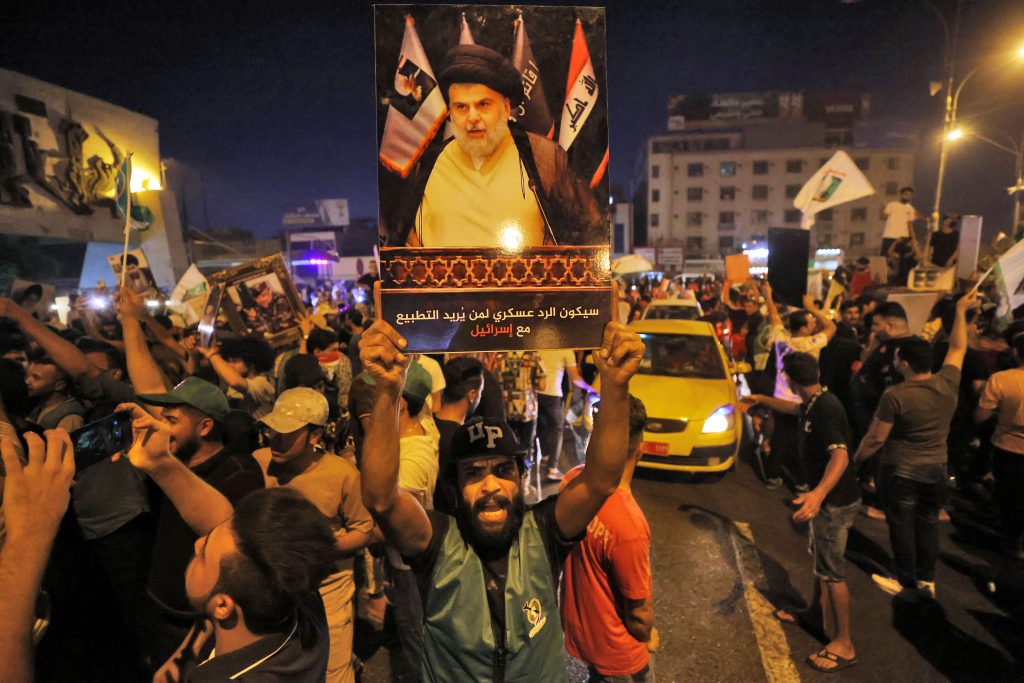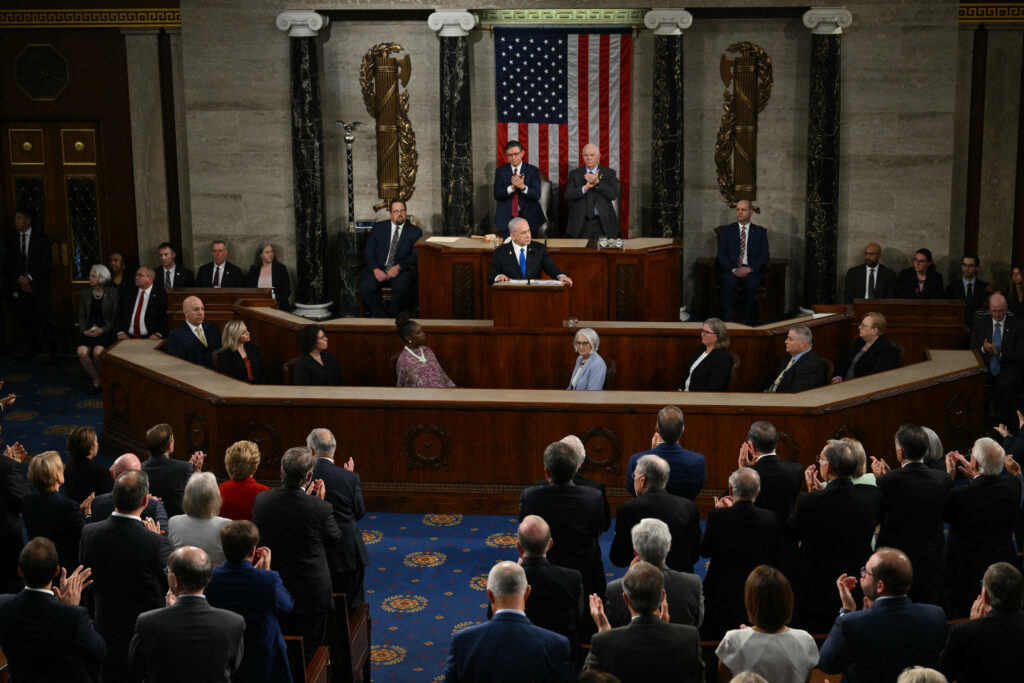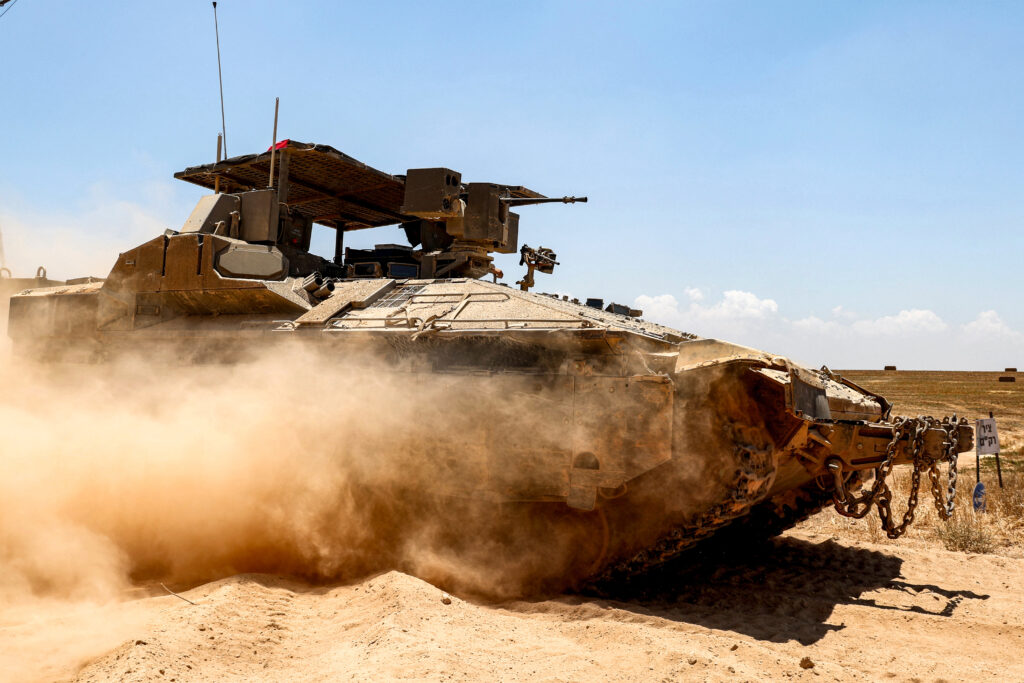Al-Sadr’s Iraq Gamble and the Limits of Iran’s Patience
- - August 18, 2022

By Gyorgy Busztin, Visiting Research Professor, MEI-NUS
The political crisis in Iraq reached dangerous new levels two weeks ago as the followers of Muqtada As-Sadr, the firebrand cleric and head of the largest political bloc in the new legislation, occupied Parliament to vent their frustration over his opponents’ bid to block him from forming a government. The Sadrists had already withdrawn from a Parliament they labelled unrepresentative of the electorate. But their adversaries could not form a government, nor could they garner enough support for their candidate for Prime Minister. In a bid to break the deadlock, Al-Sadr responded by mobilising popular pressure.
The cleric’s message was that new elections would be needed to give Iraq a fresh start. His opponents, the blandly-named “Coordination Framework” – an alliance of pro-Iran parties – agreed to new polls, surprisingly. But they wanted to first reconvene Parliament and initiate a wider social dialogue, or so they said.
However, Iraq is divided. Many are sceptical about new elections, which will be held barely a year after the last round took place. Sceptics ask what a new election will achieve if the candidates – a hopelessly entrenched political elite that has held the country in its grip since the fall of Saddam Hussein in 2003 – remain the same. But there is an equally big group that disagrees. Echoing Al-Sadr, this group argues that elections based on new rules can guarantee that the political scenery will change. Most importantly, it asserts, new elections will allow a majority government to be formed after decades of de-facto power sharing resulting from behind-the-scenes compromises and horse trading, which virtually guaranteed a place for all political parties – and left the country ungovernable.
Al-Sadr has promised zero tolerance for unprincipled political compromises, an end to the sectarian based division of spoils between Shias, Sunnis, and Kurds, and most importantly, an end to corruption. For good measure, he aimed a jab at Iran, promising no impunity to the pro-Tehran militias who killed 600 protesters demanding change in October 2019. For effect, he promised justice for the protesters, “even if it takes prosecuting Sadrists”.
It was quite the turnaround for him. His own Saraya As-Salam militias took part in the violence against protesters after he assessed that the demonstrations were harming his objectives, a fact Iraqis are not oblivious to. Now, as a tactic of convenience, he wants to team up with the protesters. He is working to woo the generation of the October protest movement, whose political agenda he silently appropriated, to join him. In a highly symbolic move, he invited the leaders of the youth movement to his home in the holy city of Najaf to discuss joining hands. It is yet unclear if they will concur.
Al-Sadr or Bust
Whatever one may think of Iraq’s messiah-to-be, his record is controversial – to say the least. Al-Sadr, scion of a great clerical dynasty that gave Iraq prominent martyrs during the Saddam years, and the bloody sectarian tussle that followed, wields unchallenged control over his supporters. Their political backing for him is mixed with religious adulation. His main source of support is the sprawling Sadr City slum of Baghdad, abode of Iraq’s urban proletariat, where the “Sayyid” (a designation of those hailing from the Holy Prophet’s family, the Ahl-ul-Bait) commands universal respect. He can mobilise millions in no time, augmented by followers from the cities of Iraq’s impoverished Shia south. No rival has a comparable power base. His opponents are the political parties, complete with armed militias, that are aligned with Iran. They took a sound beating in the last elections. Regardless, some continue to openly take their cue from Tehran. The three most prominent leaders of the loose alliance they formed (the “Coordination Framework”) are former Prime Minister Nouri Al Maliki, sworn enemy of Al-Sadr since the days he crushed his militia in Basra with US assistance during their bitter power struggle, Hadi Al-Ameri, a militia leader turned politician, and Qais Al-Khaz’ali, a militia leader with a record of gross human rights violations. While Al-Sadr has the masses on his side, his opponents have the guns.
It is against this background that the Iraqi electorate must make its choices if new elections are held. Despite his popularity among followers, Al-Sadr is seen by many others as part and parcel of the system he wants to upend. He has been a player in Iraqi politics all along, and party to many of the compromises that he now disowns. How credible he can be as reformer? Many fear that he might become a turbaned leader not unlike those sitting in Tehran, with few, if any, checks and balances on his power.
A key factor will be support for him from the Shia world’s spiritual leader, Grand Ayatollah Ali Al-Sistani. The Grand Ayatollah has distanced himself from Iraq’s politicians to remain above the fray, and consistently flaunts the notion of religion and politics merging, a concept championed and ultimately put in practice by Ayatollah Ruhollah Khomeini in Iran.
Should Al-Sadr win over the youth and get a nod, if faint, from Al-Sistani, he would be well placed to carry the next election and – for the first time in Iraq’s post-Saddam history – help set up a majority government, one that can take the hard decisions needed to reform a country beset by a dysfunctional political system, a rentier economy hooked on oil, and endemic corruption.
The View from Tehran
Iran has followed the crisis brewing next door with reserve. Tehran has confined its statements to friendly advice to all to keep calm and play it safe , wowing non-interference. The commander of the ever-attentive Islamic Revolutionary Guard Corps’ (IRGC) elite Quds Force, Ismail Qaani, surfaced in Baghdad recently on a low-profile mission aimed at reconciling the opposing parties. So far, nothing has come of this, and Tehran may be content to see new elections rather than face the danger of violence erupting in Iraq again. Keeping Iraq calm is important at a moment when Iran’s diplomats are busy with the finishing touches to what may be a resuscitated nuclear deal. The fate of the nuclear talks is a potential game-changer, and by far the most important issue for Iran now.
New Iraqi elections, if held, are months away. In the best-case scenario, preparations for polls could drag into the new year. There will be ample time for Iran to wrap up the JCPOA business. If a deal is reached, it will be anybody’s guess as to how an Iran freed of sanctions and enjoying the dividends of renewed oil exports will deal with the Iraq crisis. In such a scenario, since it will not be reliant on the spoils it can garner from its oil-rich neighbour, Tehran may be less inclined to risk poking a hornet’s nest. Iraq, divided as always, will not constitute a threat to Iran’s vital interests. Should Al-Sadr or one of his appointees take charge, Tehran would not fear Israeli infiltration either, since the cleric has legally bound himself (or any future Iraqi leader) not to do business with the “Zionist entity”, by virtue of legislation he initiated.
Iran may not be entirely happy with an Iraqi government vocally committed to what Al-Sadr is adopting as a “nationalist” political line that is not outright inimical to Iran, but not subservient to it either. While an Iraqi government that is accommodating towards Sunni politicians who are close to the Gulf countries, as well as Kurdish allies who are close to Turkey – while fostering an energy policy that favours electricity imports from Saudi Arabia – may not be particularly welcome to Iran, it is unlikely to attract outright hostility. Ultimately, an Iraq that consolidates politically and stabilises economically may be an asset rather than a liability for Iran. What counts is that Baghdad does not cross any red lines – ties with Israel, cosying up to the United States or Saudi Arabia, or getting too close with Turkey. Providing free movement to Iran’s forces to Syria and tolerating its proxy militias inside Iraq are further caveats. How Al-Sadr can accommodate all this remains to be seen, but his political history is proof that he can find a modus vivendi with Iran, if at times marred by passing discord. In the end, Al-Sadr is a member of the Shia political universe which is founded on common values, temporal and celestial, with Iran. What binds them is stronger than what separates them.
Gulf Blues
Iraq may turn out to be a litmus test when divining Iran’s next regional moves, since it relies heavily on its local proxies in the countries of the “Axis of Resistance”. These are all struggling with multiple crises, and three out of four – Syria, Lebanon, and Yemen – qualify as failed states. Iraq, however, is the interface between Iran and the Arab world, and commands special strategic importance for Tehran. Therefore, it will be instructive to see how far Iran will go to prevent it slipping from its hands.
Nobody watches this more closely than the Gulf countries, which may be on the receiving end of any conflict in Iraq that Iran would choose to resolve by direct intervention, “Putin style”. Anti-Iran sentiment is running high in the country, and Al-Sadr is out to harness it. Should push come to shove, igniting armed conflict between anti- and pro-Iranian Shia forces, Tehran may have few choices but to throw its weight behind its allies. This is a nightmare scenario for Saudi Arabia and beyond. It is little wonder, then, that the Gulf countries are seeking to re-establish formal dialogue with Tehran.
Iraq, a Gulf country, has been separated from the rest by a very different political trajectory and then the US occupation, which the other GCC states never condoned. After the US exited, they watched in dismay as Iran all but took over. They would welcome Al-Sadr as a moderate Shia and Iraqi nationalist they can do business with, while hoping he can reduce Iran’s nefarious influence. Embracing, if not integrating, Iraq into regional cooperation more closely is a distant prospect for the Gulf (if ever), but one that starts with Baghdad putting its house in order first. In so doing, it needs to restore peace between its many warring political factions. Just as importantly, it will need to limit Iranian interference in its domestic affairs. Al-Sadr’s gamble is an attempt to do both.
Image Caption: Supporters of Iraqi Shiite cleric Moqtada al-Sadr celebrate in Baghdad’s Tahrir square on 11 October 2021 following the announcement of parliamentary elections’ results. – The political movement of Iraq’s influential Shiite cleric Moqtada Sadr said it had retained the biggest share of seats in the country’s parliament, after elections with a record low voter turnout (Photo by AHMAD AL-RUBAYE / AFP)
About the Author
Dr Gyorgy Busztin is Visiting Research Professor at the Middle East Institute, NUS.
A career diplomat and an academic, he served, between 2001 and 2011, as Hungary’s ambassador to Indonesia and subsequently, Iran. In 2011, Dr Busztin was appointed deputy envoy of the United Nations in Iraq, responsible for the political, analytical, electoral and constitutional support components of the UN’s mission in Iraq. He served at the level of assistant secretary-general until October 2017.
Dr Busztin holds a degree in Arabic history from Damascus University, Syria and a Doctorate in Arabic language and Semitic philology from Lorand Eotvos University in Hungary. In addition to his native Hungarian, he speaks English, French, Arabic, Farsi/Dari (Persian), Malay (Indonesian) and Russian. He believes strongly in political and intercultural dialogue and has engaged leading politicians, intellectuals, religious leaders and representatives of civil society.
More in This Series
More in This Series
- Jean-Loup Samaan
- - July 11, 2024
- Aisha Al-Sarihi, Ehsan Rasoulinezhad, Jinseok Sung
- - June 20, 2024








